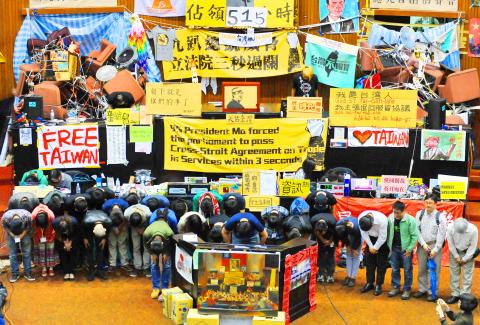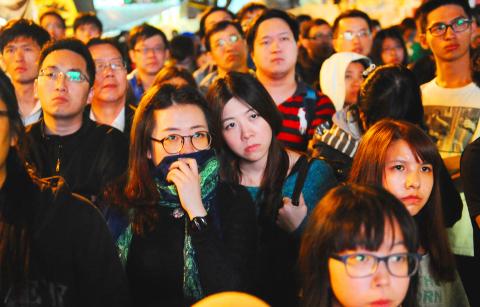Student protesters who have occupied the Legislative Yuan’s main chamber since March 18 will vacate the room at 6pm on Thursday, student leader Chen Wei-ting (陳為廷) said yesterday evening after long debates among the participating students and other groups.
Saying their 21-day occupation of the chamber to protest against the government’s handling of the cross-strait service trade pact “has demonstrated that we do not have to be restrained by the past political model and establishments or to have our fate determined by international powers,” Chen said the students have gathered enough support and strength to expand into a movement that incorporates everyone.
“We have shown how the ‘sovereignty of the people’ promised by the Constitution can be realized and become a real-life experience for our generation. And now we, the young, will be making strides from the legislature to the entire nation,” he said. “We will shift our strategy from the defensive to one that is ready to attack.”

Photo: AFP, Mandy Cheng
Chen said progress has been made on all four of the students’ major demand: the institutionalization of a cross-strait agreement oversight mechanism, the completion of such legislation before the review of the service trade agreement, the launching of a citizens’ constitutional conference and the retraction of the service trade agreement.
“The non-government version of a draft proposal for the institutionalization of an oversight mechanism, based on the principles of civic participation, legislative supervision, human rights protection, transparency and government accountability, has been proposed to the legislature,” Chen said.
The demand to “legislate first, review second” has met with a positive response from Legislative Speaker Wang Jin-pyng (王金平), who promised not to convene inter-party negotiations on service trade pact before oversight mechanism has been legislated, he said.

Photo: Chang Chia-ming, Taipei Times
The idea of a citizens’ constitutional conference has also been widely discussed in forums both outside and inside the Legislative Yuan over the past week, Chen said.
The demand that the controversial service trade pact be retracted was answered by a resolution of the legislature’s Joint Committee meeting on March 24, which requested the Executive Yuan retract the agreement and reopen negotiations with China.
“The final decision relies on the handling of the floor meeting,” Chen said.
The Sunflower movement’s achievements are not restricted to the above-mentioned results, he said.
“The students and civil groups have halted the forced passage of the agreement and demonstrated that [President] Ma [Ying-jeou’s (馬英九)] administration’s has lost legitimacy, because since 2008, it has been abusing power, making arbitrary decisions, breaching the rule of law, violating human rights and causing democracy to retreat,” he said.
“The movement has revealed how the current cross-strait interaction has been dominated by the clandestine, under-the-table trading between the Chinese Nationalist Party [KMT] and the Chinese Communist Party, a model that only helps the cross-strait political elite and capitalist corporations amass their fortunes and sacrifices the rights and benefits of most of the public,” he said.
“From this moment on, no behind closed doors negotiation is allowed; no regime can be permitted to make brazen moves to sell out Taiwan,” Chen said. “We Taiwanese, not anybody else, are the masters of this island.”
Internationally and geopolitically, “we have made our will clear,” he said. “We have declared that we Taiwanese are not willing to stay under the sway of China. We have also interrupted the private arrangement of international powers, including China, the US and Japan, and attracted global attention by our peaceful, non-violent resistance to the establishment.”
The protesters’ next step will be turning from a passive occupation to an active movement nationwide by organizing talks, grassroot forums, online civic movements and overseeing the legislature, just as the “Kuroshio democracy has been doing outside the occupied legislature over the past weeks,” he said.
“We are not naive. We do not believe that all of our demands will be fully answered. That is why we need to shift our strategy from ‘defense’ to ‘attack’ and continue to supervise the government,” he said.
Lin Fei-fan (林飛帆), another student leader, said the decision to leave the Legislative Yuan had not been a unanimous one.
“However, we are not afraid to lose the chamber floor, and leaving here is not the end of the movement, because the movement has become a comprehensive one that will continue to bloom across the country,” Lin said.
A Tamkang University student surnamed Lai (賴), one of the Sunflower movement supporters outside the Legislative Yuan last night, was very emotional upon hearing Chen Wei-ting’s announcement.
"I am very tired. All of us here at the Legislative Yuan — all of us who feel we have been abandoned by the government — we all want to go home. We have been keeping up the protest through sheer strength of will because we need to oppose governmental violence," he said.
A National Tsing Hua University student surnamed Chen (陳) said that with all that has happened: "I do not and cannot trust the KMT caucus."
He said the students will continue to emphasize their concerns about the service trade pact by supporting efforts to recall KMT lawmakers who follow the party line instead of listening to the public’s voices.
Additional reporting by Lin Chia-chi
This story has been updated since it was first published.

ENDEAVOR MANTA: The ship is programmed to automatically return to its designated home port and would self-destruct if seized by another party The Endeavor Manta, Taiwan’s first military-specification uncrewed surface vehicle (USV) tailor-made to operate in the Taiwan Strait in a bid to bolster the nation’s asymmetric combat capabilities made its first appearance at Kaohsiung’s Singda Harbor yesterday. Taking inspiration from Ukraine’s navy, which is using USVs to force Russia’s Black Sea fleet to take shelter within its own ports, CSBC Taiwan (台灣國際造船) established a research and development unit on USVs last year, CSBC chairman Huang Cheng-hung (黃正弘) said. With the exception of the satellite guidance system and the outboard motors — which were purchased from foreign companies that were not affiliated with Chinese-funded

PERMIT REVOKED: The influencer at a news conference said the National Immigration Agency was infringing on human rights and persecuting Chinese spouses Chinese influencer “Yaya in Taiwan” (亞亞在台灣) yesterday evening voluntarily left Taiwan, despite saying yesterday morning that she had “no intention” of leaving after her residence permit was revoked over her comments on Taiwan being “unified” with China by military force. The Ministry of the Interior yesterday had said that it could forcibly deport the influencer at midnight, but was considering taking a more flexible approach and beginning procedures this morning. The influencer, whose given name is Liu Zhenya (劉振亞), departed on a 8:45pm flight from Taipei International Airport (Songshan airport) to Fuzhou, China. Liu held a news conference at the airport at 7pm,

Taiwan was ranked the fourth-safest country in the world with a score of 82.9, trailing only Andorra, the United Arab Emirates and Qatar in Numbeo’s Safety Index by Country report. Taiwan’s score improved by 0.1 points compared with last year’s mid-year report, which had Taiwan fourth with a score of 82.8. However, both scores were lower than in last year’s first review, when Taiwan scored 83.3, and are a long way from when Taiwan was named the second-safest country in the world in 2021, scoring 84.8. Taiwan ranked higher than Singapore in ninth with a score of 77.4 and Japan in 10th with

GRIDLOCK: The National Fire Agency’s Special Search and Rescue team is on standby to travel to the countries to help out with the rescue effort A powerful earthquake rocked Myanmar and neighboring Thailand yesterday, killing at least three people in Bangkok and burying dozens when a high-rise building under construction collapsed. Footage shared on social media from Myanmar’s second-largest city showed widespread destruction, raising fears that many were trapped under the rubble or killed. The magnitude 7.7 earthquake, with an epicenter near Mandalay in Myanmar, struck at midday and was followed by a strong magnitude 6.4 aftershock. The extent of death, injury and destruction — especially in Myanmar, which is embroiled in a civil war and where information is tightly controlled at the best of times —